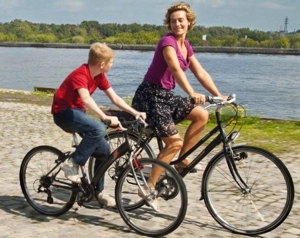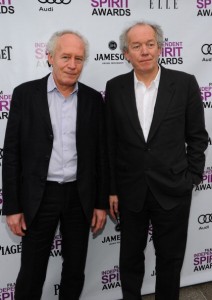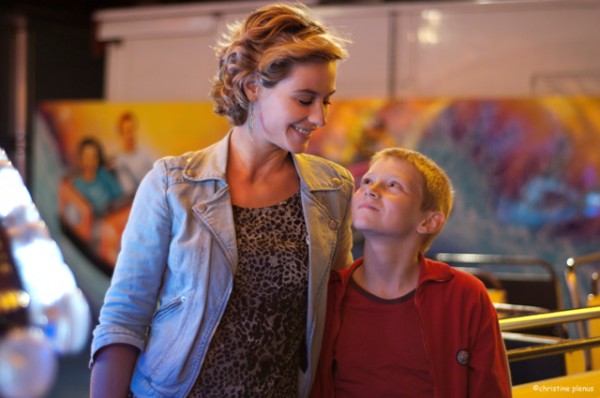Film Review: “The Kid With a Bike” — Journey to a State of Grace
The Kid With a Bike is a story of grace, compassion, redemption, and of the possibility of goodness in a very difficult and imperfect world.
The Kid with a Bike (Le Gamin au Velo). Directed and written by Jean-Pierre Dardenne and Luc Dardenne. At the Kendall Square Cinema and the West Newton Cinema.
By Tim Jackson
The films of Jean-Pierre and Luc Dardenne are in thrall to emotional moments. The filmmakers work from inside the world they create, without judging its characters, letting the story proceed naturally, providing a minimum of off-screen information, forcing the audience to imagine the non-narrative details.
This minimalist approach demands patience from audiences because it is a cinema dedicated to lyricism rather than story. The Kid With a Bike takes an honored place in the Dardenne brothers’ unique and highly praised body of work, powerful examples of realist film making that examine working class lives on the edge. Like their past films La Promesse, Rosetta, The Son, L’Enfant, and Lorna’s Silence, this film is ultimately hopeful.The audience is brought effortlessly into the hearts of the characters, and we, too, are transformed.
The film wastes no time getting underway: Cyril, the 11-year-old boy of the title, places a call to his father. The number is disconnected. He wants his bike back, and, despite the reasoning of the adults at the youth farm where he new lives, Cyril refuses to acknowledge that his father may have sold his bike and abandoned him. The bike lifts him out of the meagerness of his life while his father anchors him to the world. Losing both things is impossible for the boy to understand.
But Cyril is a scrapper, determined to do anything to return to his father. He finagles, fights, bites, and crawls out windows. Dressed in a flaming red jacket and t-shirt, he runs or bikes, continuously in motion. He won’t be tied down or defeated, but when the inescapable fact that his father is gone finally sinks in, he falls into a lonely sleep, and we hear a few unresolved bars of Beethoven’s Fifth Piano Concerto. For the directors, this use of music is rare, but the same short passage will mark other significant moments in the story. Luc Dardenne explains the music is meant to “appear like something of a caress, something soft, that Cyril needs and is missing.”
In an attempt to visit his father’s now vacated apartment, Cyril literally runs into Samantha, a local hairdresser, knocking her to the floor. When she unexpectedly reappears later at the youth farm, she has his bike with her, which she bought after seeing a posted advertisement. Still, the boy refuses to believe his father would have sold it. “It must have been sold by the person who stole it,” he claims. The motivation behind Samantha’s gift is not clear, but Cyril stares long and hard at her, touched by this strange moment of kindness. He scoots off on his bike, catches up with her car, and asks, “Can I stay with you?” When she agrees to take him in for weekend visits, the story is set in motion.
The relationship between them is difficult. It is obvious that the boy has never experienced love or the kind of acceptance that Samantha is willing to give. One night Cyril stares into the darkness at Samantha sleeping with her boyfriend. Startled, she brings him back to his own room, lies with him, and asks, “What is it?” “I want my dad,” he replies simply. A pause. He whispers, “It’s warm. Your breath.” Typical of the Dardennes there is no high drama, no lengthy dialogue about love and loss. In moments like this, so much is said with so little, words are exchanged without directorial judgment. Scenes unfold gently and provide their own poetry.
The two set about searching for the boy’s father. “Don’t be upset if it is not the way you dream,” she tells him. He responds, “I don’t dream.” Pushed by Samantha’s calm insistence, Cyril’s father is forced to directly and unequivocally tell the boy that he cannot and will not take care of him. In the car on the way home, the child pounds his head on the car door and then scratches his face. At the sight of this loss, the concerto phrase rises and exits once more. What unfolds is more than your standard coming-of-age narrative. It is a story of grace, compassion, redemption, and of the possibility of goodness in a very difficult and imperfect world.
Cecile De France and Thomas Doret are effortless and natural as Samantha and Cyril. Jeremie Renier, who appears in several other Dardenne films, is the father. His previous part in L’Enfant as a n’er-do-well father who attempts to sell his infant was an earlier version of this role. DeFrance’s diverse credits include the brutal, French, cult horror film, High Tension, the sophisticated Avenue Montague, and Clint Eastwood’s Hereafter. But it is Thomas Doret who is at the film’s center. Chosen by the filmmakers for his remarkable concentration, he blurs the line between behavior and performance. Despite his innocent looks, detached gaze, and anti-social behavior, Doret is astonishing at catching Cyril’s deep need for human connection.
The filmmaker’s casting of non-professional actors is legendary. With Rosetta, the filmmakers interviewed 300 women, narrowing their choices through a series of improvisations. When casting is complete the directors rehearse for months with the actors and continue to improvise for weeks prior to shooting. The action of a scene is usually specific and carefully worked out, though the dialogue is often created at the moment. Shooting via handheld camera creates a sense of immediacy, though the camera moves and framing are worked out for months before the actors even begin.
Once shooting starts, one Dardenne brother hovers over the actors to assure that they are focused and in the moment. The other brother checks the video monitor. Often they will reverse roles. This rigorous, disciplined approach puts pressure on the performers to be completely committed, physically and emotionally, to each scene. The camera lingers on faces, giving the audience ample time to read the nuances of character.
The Kid With a Bike moves forward at brisk pace. The action quickly and logically moves from one event to the next. Each scene provides a specific poetic or psychological insight into character. Yet this is no self-conscious study of personality. What is unique to the films of the Dardenne brothers is the need for the audience to commit themselves to the world on the screen. The film is not leading us to a conclusion nor to a convenient revelation. Samantha’s background is purposefully not defined. When Cyril asks, “Why did you let me come here?” She thinks for a moment and says, “I don’t know.” Emotionally she does know, and we sense that. Why is Cyril’s father such an irresponsible lout? Is he capable of love at all? Where is the mother? What makes some characters go bad while others are forgiving?
These are questions that the filmmakers demand we commit ourselves to asking. In the heartbreaking concluding shot, as simple and common as everyday reality, the music cries one last time. What has been lost, and what has been regained? The answer to that question must be intuited by us; it is not in the script. It is a rare work of art that brings an audience to this imaginative state of grace.
Tagged: Jean-Pierre Dardenne, La Promesse, Lorna's Silence, Luc Dardenne, L’Enfant, Rosetta, The Kid With a Bike




Always enjoy your writing, Mr. J. And thanks for this review in particular. It’s probably a film that would have otherwise slipped under my radar. Oh, and lookie here, it just happens to be playing at a Portland theater. Bingo!